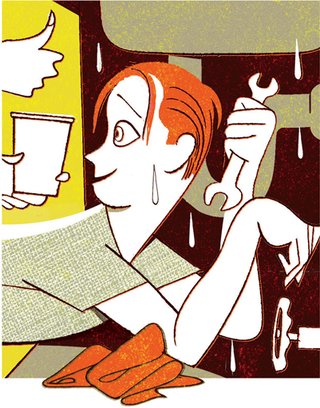By Rebecca Matthes,
When we enter into long-term relationships—and certainly marriages—we may keep in our mind a list of the things we’d like to get from (and, one hopes, are willing to give to) a partner. Recent research suggests certain gestures are especially important for fostering satisfaction and are closely associated with couples’ long-term success. Collectively, these can be thought of as a Relationship Bill of Rights.
“Expectations are essential, and if you’re not expecting good stuff, then you very likely won’t get it,” says social psychology professor Eli Finkel, who directs the Relationships and Motivation Lab at Northwestern University and is the author of The All-Or-Nothing Marriage. “We should be honest with ourselves about what things are essential for us to get through the marriage, focus on those things, and let the other things go.”
This goal, he says, shouldn’t be put aside when couples face conflict, because every partner has the right to disagree—and to be imperfect. “It’s constructive to think of difficulties not only as unpleasant circumstances to be endured but also as opportunities to learn about each other and deepen the relationship,” Finkel says. “I’m optimistic about people’s ability to make progress on problems.” But he notes that resolution is more likely if partners’ beliefs about relationships are not based on the theory that people must find the one and only individual who’s perfect for them. The idea that any given partner is “meant to be”—or not—can make someone more likely to discard a relationship when hard times hit, convinced that the search for an ideal mate needs to continue elsewhere.
The following rights have consistently been found to form a baseline that gives couples the best chance of going the distance.
You have the right to your partner’s attention.
Your partner’s attention is likely to improve your satisfaction with a relationship, whether it’s spontaneous—like an unexpected afternoon text that makes you smile—or in response to your requests. A 2017 study on relationship experiences published in the Journal of Personality and Social Psychology found that on the days when their partners had supported them or said something that made them feel loved, people reported higher relationship quality.
Couples often show attention to each other in the little things they do. Jennyvi Dizon, 37, a fashion designer in New York City, is touched every time her husband of 15 years picks up a treat for her at the grocery store or remembers that she needs almond milk for her breakfast. “He says it’s his job to remember,” she says. “He really believes in the saying, ‘Happy wife, happy life.'” In return, she makes a point of tucking him in when he goes to bed every night, though she herself often doesn’t go to sleep until a few hours later.
How to get it: If your partner is kind, but not naturally attentive, it may help to explain the sort of attention you need and then to give positive feedback when you get it. And if busy schedules conspire to keep you from each other, engineer some together time. As Finkel explains, “Spouses who spend more time together engaged in actual conversation tend to be happier than those who spend less. And spouses who pursue more leisure activities together—including outdoor activities, sports, card games, and travel—are at reduced risk of divorce.”
Proposed amendment: The arrival of a child typically causes couples to take a short-term happiness hit because their attention is diverted from each other to the new addition; newborns in particular tend to be quite vocal about their own rights. New parents spend less time talking or doing activities together, and their relationship satisfaction declines as a result, making this a time to be even more conscious of finding or making moments to focus on each other.
You have the right to a partner who will try to work out your differences.
All long-term relationships encounter sore spots and conflicts. Ignoring these problems won’t make them go away, even if partners do so because they sincerely don’t want to pick a fight. “No relationship can thrive when the two parties hold in frustrations that need to be shared and resolved,” says Leon Seltzer, a clinical psychologist in Del Mar, California. “When couples stop trying to work out their differences and revert to passivity to keep the peace, they hold more and more inside of them and their alienation grows. The frustrations tend to leak out through sarcastic, taunting remarks, thinly veiled criticisms, or increasing inattention to the other’s needs.”
Illustration by Eric Palma
Addressing problems as they arise improves spouses’ psychological well-being and ratings of marital quality, especially for women. One study of 205 married couples found that wives who believed that their husbands did more emotional work were more satisfied with their relationships.
Once differences are out in the open, even those that might have seemed irreconcilable in one’s imagination can often be addressed with a compromise or a conscious agreement to disagree. “You can learn to validate the hardcore differences that exist—and will always exist—between you and your mate,” Seltzer says. Consider a scenario in which one partner is far more extraverted than the other. Rather than sitting at home seething, or endlessly haranguing a husband or wife who doesn’t want to go out, partners who open a conversation might discover that their mate really doesn’t mind if they sometimes socialize without them.
Monica and Melvin Pullen, both 42, of Lititz, Pennsylvania, had been married for about four years, and were expecting their first child, when they bought their first home with the understanding that both would continue to work. However, once their daughter arrived, “I knew immediately that I didn’t want to return to work,” Monica says. But she kept it to herself. After about six months, the family started to feel the financial strain. Finally, she confessed her feelings. “He was fine with my staying home; we would just need to downsize.” As they prepared to do that, a new job came along for Melvin that allowed them to get by without needing to move. Still, Monica says, “the experience taught us to be upfront, open, and honest about what we want, regardless of the outcome.”
How to get it: “The party that initiates the discussion must do so with tact, diplomacy, and restraint—and the willingness to respect the other’s reluctance to engage on a topic that might make them feel very vulnerable,” Seltzer says. If your partner is prone to conflict avoidance or stonewalling, you may need to maneuver around those defense mechanisms: “I know this topic makes you uncomfortable, and that’s the last thing I want, but I think pushing it under the rug is keeping us from being closer. Can we talk about this in a way that helps us both understand why it’s so button-pushing? I want us to be closer and more trusting of each other.”
The discussion should help each of you better understand the other’s needs—and you’re both entitled to a partner who will validate your position, even if they don’t agree with it. “Resolution doesn’t always take the form of one person having to change their views or behavior,” Seltzer says. “It’s empathic understanding that minimizes the conflict.”
Proposed amendment: In some cases, as a couple ages, confronting problems head-on can actually lose some of its positive effect and even turn counterproductive. A 2015 study published in the Journal of Family Psychology suggests that for older wives, more marital “work” is associated with decreased satisfaction with their union. A research team led by Jakob Jensen of East Carolina University proposed that as we age, our marital priorities shift away from conflict resolution and toward maximizing the emotional rewards of maintaining a relationship.
Illustration by Eric Palma
You have the right to a partner who’ll share the load.
This is a right well worth defending, in part because it appears to deliver significant benefits to both partners.
The stark division of household labor that was nearly ubiquitous in households of the past is less common today, with both outside earnings and domestic responsibilities more likely to be shared by partners. A 2018 study, published in Socius and led by Daniel Carlson of the University of Utah, compared national data from the early 1990s and 2006 and found that contemporary couples shared more household tasks than did couples in even the recent past, and that this advantaged many aspects of their relationships, starting with their sex lives. “Sharing housework is associated with greater feelings of fairness, teamwork, and overall relationship quality,” Carlson says. “In particular, feelings of teamwork—communication, cooperation, and shared vision—are important to sexual intimacy.” These feelings foster a partnership based on reciprocity and mutual gratification, he has found, improving a relationship’s quality and lowering the risk of its dissolution.
It isn’t necessary that couples split the work precisely in two, research finds—which is fortunate, because most couples still do not do so. In about 31 percent of families with two parents working full-time, women still handle more household chores and responsibilities; 59 percent report that they share them equally. And in more than half of these families, women continue to do more to handle children’s schedules and activities, according to 2015 data from the Pew Research Center. But Carlson’s work still shows measurable benefits to a couple’s sex life as long as neither partner does more than 65 percent of the domestic work. Partners tend to be satisfied with relationships in which the work is divided, not necessarily equally, Carlson says, but in a way they both feel is fair.
How to get it: Discuss your expectations with your partner. “I would even recommend writing down the tasks that you have and coming up with a plan to divide them and then track their completion,” Carlson says. “Partners—men especially—often don’t see that they are not contributing to the degree they promise, so having something concrete to point to can be helpful.”
“We had a lot of fights about housework,” says Anna Aquino, 40, of Canal Winchester, Ohio. “The majority of it wouldn’t get done or would fall to me. Because I work from home, I understand I can have more to do, but I would get frustrated, and my husband would get annoyed when things weren’t done. It didn’t seem fair to anyone.” The couple finally agreed to post a chore chart on the fridge. “It saves a load of fights,” she says. The day-to-day chores aren’t split down the middle, since Aquino’s husband works more outside the home, but she says both partners are happier now because “it’s pretty fair all around and everyone agreed to it.”
Proposed amendment: When it comes to sharing domestic responsibilities, couples don’t need to aim for a specific target, but should work to find the breakdown that serves their relationship best. “You could have a good relationship with someone doing 100 percent of the household work,” Finkel says. Your partner might actually love cooking, cleaning up, and caring for kids or pets, while you feel more fulfilled by work and hobbies. “If a couple sees that as fair,” Carlson says, “they certainly can be happy.”
Illustration by Eric Palma
You have the right to honesty about sex.
What are partners entitled to in the bedroom? The answer will vary from couple to couple, but the research finds that it’s not necessarily the presence or absence of sexual activity, a specific schedule or frequency, or even the pleasure derived from it that is most associated with relationship satisfaction. What matters is that both partners’ expectations, whatever they are, are met. That’s why two people can sincerely find satisfaction in a sexless relationship: If neither expects sex, nor seeks it, its absence doesn’t affect how they feel about each other. But sexual expectations can and do change over time, and it’s crucial for a couple’s satisfaction that partners communicate shifts in both their desire and their capability.
“It’s the disparity in partner preferences, whether for frequency or type of stimulation, that can potentially result in the greatest unhappiness,” says sex and marital therapist Michael A. Perelman, a professor of psychiatry at Weill Cornell Medicine in New York City. When such a disparity exists, “communication and compromise skills become critical to mutual satisfaction.” Both partners need to be upfront about their expectations and help their partner understand them. From this place, a mutually agreeable plan can be drafted. If never-uttered sexual concerns are leading one partner to question his or her place in the relationship, the other partner has the right to hear about it, no matter how awkward the ensuing conversation may be.
How to get it: Find a comfortable time to talk about the issues, Perelman advises. For some, it might be while relaxing in bed, a setting that can lead to openness and intimacy; for others, he says, such a conversation will best be broached over a glass of wine or a cup of coffee, “in any comfortable place that affords privacy.” Try a gentle opener: “I have a few thoughts about our sex life I’d like to discuss, if that works for you.”
Proposed amendment: Partners should never criticize each other during sexual activity (unless something is uncomfortable or painful). If you’re hesitant to start a conversation, you might unilaterally consult a sex therapist first. “Even if only one person in the couple seeks assistance, it’s highly likely that some relief can be found,” Perelman says.
Illustration by Eric Palma
You have the right to affection.
Sexual passion may wax or wane over time in any long-term relationship, but it’s important that affection carry on. “Giving and receiving affection is associated with feelings of pleasure, acceptance, happiness or contentment, and a sense of being loved or cared for,” says Anita Vangelisti, a communications professor at the University of Texas at Austin who has studied affection’s effects, specifically in the early years of marriage. She has found that hearing “I love you,” and receiving physical affection outside of sexual intercourse, among other behaviors, predicts higher marital satisfaction for both men and women.
While expressions of affection typically become a little less frequent over time, she says, “partners who maintain relatively high levels tend to be happier.” Research on the physiology of affection has also shown that giving and receiving it are associated with the release of oxytocin, as well as the regulation of stress hormones throughout the day, enhancing well-being and enabling each partner to manage stress more successfully.
How to get it: “Ask for it,” Vangelisti says. You can start by giving more affection to your partner. “Once your partner sees you giving them more affection, they may reciprocate.” You can try to arrange more opportunities for affection by planning relaxed time together. “If one or both of you are always busy and rushing around, it’s more difficult to give and receive affection.”
And don’t fear that “manufacturing” affectionate behaviors, or the opportunities for them, will strip them of their power. Research by Brittany Jakubiak of Syracuse University and Brooke Feeney of Carnegie Mellon University has shown that people felt more secure and trusting in a relationship, and more confident that it would endure, after a partner held their hand or threw an arm around their shoulder, even if they were told that the partner had been instructed to show them affection.
Proposed amendment: Be clear about the type of affection you seek and make sure you and your partner both understand how you each define the term. If they think they’re showing affection by taking your car to get washed, while you want hugs and a whispered “I love you,” that’s the kind of misunderstanding that can erode satisfaction with a relationship.
Illustration by Eric Palma
You have the right to the benefit of the doubt.
Relationships flourish when couples attribute the best of intentions to each other all the time. This means that, yes, your partner really should view you through rose-colored glasses, idealizing you in normal circumstances and forgiving you relatively easily when you fall short. “A little bit of positive illusion is better,” Finkel says. “It’s easy to go down rabbit holes of perceived slights, but if we have a general view that our partner is loving and at core a decent person—maybe even more decent than they really are—then when we do have difficulties, we’re better at overcoming them. Some amount of self-delusion is linked to better relationship quality.”
Relationship satisfaction typically starts falling immediately after a couple says “I do,” but many studies have pointed toward a prescription for sustaining it. In just one recent example, Sandra Murray of the University at Buffalo found that partners who continue to idealize their spouse, even somewhat unrealistically, experience less decline in satisfaction with the marriage over three years than people who cannot maintain the same belief.
How to get it: “We have a lot of latitude in how we perceive our partner’s behavior,” Finkel says. If you show up late to an important event, your partner could label you inconsiderate—or remember that you’ve been overwhelmed at work but are still trying to get everything done. If you or your partner tend more toward reflexively blaming the other, try thinking about the situation from the perspective of a neutral third party who wants the best for both of you. “It gets us out of our myopia and gives us a broader perspective,” Finkel says. Implementing some psychological distance can help you and your partner feel less angry about conflicts and should strengthen the relationship over time.
Proposed amendment: Beware of the doormat effect. “We have studies showing that if someone is highly forgiving, with no amends made, or if a partner is always difficult, forgiveness may still have beneficial consequences, but it undermines the aggrieved party’s self-respect,” Finkel says. If a problem festers over time, the relationship is likely to suffer. Minor flaws or occasional missteps can be sugarcoated, but more serious issues must be addressed and ideally resolved.
“It’s a shared responsibility,” Finkel says. Partners need to own up to hurtful things they’ve done and express regret, even if they don’t fully believe they are in the wrong. For the hurt partner, there’s a lot of benefit in both hearing an apology and seeing amends. It can help you both put infractions in the past. “Let them be speed bumps, rather than barricades.”
Illustration by Eric Palma
You have the right to gratitude.
Partners who are grateful for each other, studies have shown, feel more satisfied in their relationships. And even when just one partner feels gratitude—whether on an existential level or for simpler things like being brought a favorite drink—both benefit. Amie Gordon of the University of California, San Francisco calls it a cycle of gratitude. “If you start doing nice things, and your partner picks up on it and feels appreciated, it should inspire their own good feelings,” she says. Gratitude can increase people’s motivation to stay in, and improve, a relationship, and make them more likely to engage in more considerate behaviors, like better listening and sacrificing for their partner. Gordon’s research has shown that more grateful people are likelier to maintain long-term relationships.
A recent study in Social Psychological and Personality Science suggests it’s the feeling of gratitude that makes a difference, not the acts that engender it. Researchers found that people are equally likely to notice a partner’s sacrifice as not, and they are just as likely to see a sacrifice where there is none as they are to correctly note its absence. No matter: When a person believes a partner has sacrificed for them, accurately or not, the benefits of gratitude accrue. And when they fail to detect a sacrifice, their partner feels less satisfied.
How to get it: Your partner is not obligated to keep a gratitude journal or meditate with you on life’s blessings. So how to elicit it? You can prime a partner’s expressions of gratitude by showing your appreciation for them. “If you feel unappreciated or taken for granted, try doing some of the things you wish they would do for you,” Gordon suggests. “It’s a nice way to jumpstart gratitude in a reasonably well-functioning relationship.” If you’re having trouble accessing your own gratitude, think about what life was like before you were with your partner. That can help counter hedonic adaptation—or becoming accustomed to, and perhaps less appreciative of, the benefits they bring to you. When showing your own gratitude, make it personal. “It’s not just, ‘Hey, thanks for taking out the trash.’ Say, ‘You know how much I hate it; you’re so thoughtful for doing the thing that I hate.’ You’re not just thanking them for the act,” Gordon says, “but for the person they are. It bumps it up a notch.”
Proposed amendment: Gratitude shouldn’t be used to gloss over problems such as emotional abuse. “It’s not healthy to try to feel gratitude because, hey, this person didn’t yell at me today, or get mad when they usually do,” Gordon says. No one should use gratitude to prop up a relationship that they should be exiting.
https://www.psychologytoday.com/us/articles/201811/your-relationship-bill-rights







